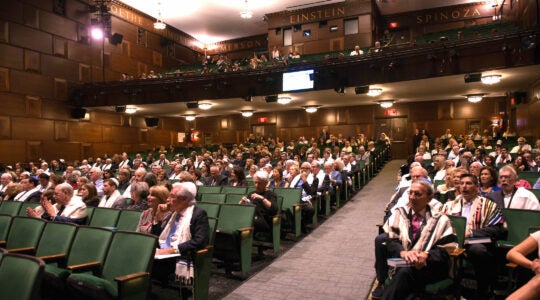The right-wing government of Israeli Prime Minister Benjamin Netanyahu has angered liberal and progressive American Jews by delaying implementation of the agreement to make the Western Wall more accessible to non-Orthodox Jews; enacting a nation-state law that critics complain undermines Israel’s basic democratic principles; and including a racist party in its new coalition.
Its chief rival in next Tuesday’s election is the new Blue and White party that will initially be led by former military chief of staff Benny Gantz. Blue and White’s platform includes a commitment to implement the Kotel agreement and have it be overseen by a non-Orthodox group of Jewish leaders — just one in a series of proposals to challenge the current Orthodox hold on religion and state issues. In addition, the new party calls for legislation to permit same-sex civil unions and surrogacy by same-sex couples, a willingness to enter into peace negotiations with the Palestinians, public transportation on the Sabbath and cancellation of the law that bars certain trade on Shabbat.
Although Gantz’s party may win the popular vote, few Jewish leaders here believe he will be able to cobble together enough parties to form a coalition government with at least 61 seats in the Knesset.
“Many of my friends are hopeful about Gantz but not optimistic he will win,” said Rabbi Steven Wernick, who speaks for the Conservative movement on political issues in Israel. “Most North Americans are sanguine about the elections; they would like to see a change but are resigned to more of the same. … There is still a gap between Israel and the diaspora as it relates to religious issues and equality within the Jewish state. The longer that gap continues, diaspora Jews will feel more frustrated and disenfranchised.”
Should Gantz be able to form a government, his premiership “would improve the mood among liberal American Jews regarding Israel because people would feel there is a change in the air,” said Kenneth Bob, president of Ameinu, a community of progressive American Jews seeking social and economic justice in Israel and the United States.
“His tone is to reach out a hand to the diaspora community,” he continued. “His platform speaks of religious pluralism and the importance of repairing the Israel-diaspora relationship.”
That relationship is now arguably at an all-time low, a fact few in Israel seem to care about.
“When Israelis go to the polls they will hardly care about the impact [of their decision] on the American Jewish community,” observed Ori Nir, a spokesman for Americans for Peace Now, who just returned from a week in Israel and said he found a virtual disconnect between the concerns of Israeli and American Jews.
The values divide between American and Israeli Jews was highlighted two weeks ago by a letter sent to Netanyahu and signed by more than 100 liberal Zionist millennials. It said they were committed to “advancing Israel’s well-being” but were finding it “increasingly challenging” because of the country’s troubling “policies, actions and rhetoric.” And it asked Netanyahu to “ensure Israel remains the homeland for all Jews and a state of all its citizens.”
Failure to take those steps “could seriously erode support for Israel among our generation of U.S. Jews,” it warned.
Should Gantz be asked by Israeli President Reuven Rivlin to form a new government and be successful, he will in all likelihood be able to fulfill his campaign promises because he will be “less likely to be dependent on the religious parties” that are key to Netanyahu’s current coalition, according to Dennis Ross, who served as special Middle East coordinator under President Bill Clinton.
“For him, it becomes a natural opportunity to connect with the Reform and Conservative communities that make up the backbone of the American Jewish community,” said Ross, now a counselor at the Washington Institute for Near East Policy. “The vast majority of American Jews are Democrats, and there is a deep sense of alienation with Trump and Netanyahu — and a potential for Gantz to … connect with Democrats.”
Although Gantz may want to restore the Kotel arrangement and “identify with pluralism, he may be compelled to form a government with the ultra-Orthodox parties” that would tie his hands on those issues, observed David Makovsky, director of the Washington Institute’s Project on the Middle East Peace Process.
He said that although the ultra-Orthodox parties would prefer to form a coalition with Netanyahu’s Likud Party, “they would go with Gantz as their second choice. As one of their religious leaders said, ‘I promise to be with Likud in the government, but not in the opposition.’”
And putting together a coalition government would not be easy for Gantz, according to Farley Weiss, president of the National Council of Young Israel. “There would be huge obstacles for him to overcome,” he said, adding he could more likely envision a scenario in which Gantz serves as defense minister in a Netanyahu coalition government.
Bob of Ameinu agreed, saying he believes that if Netanyahu is asked to form a government, it is “very likely” he would “reach out to Gantz because his potential right-wing partners are very extreme and I don’t think he wants to be a prisoner to them — especially with the Trump peace plan about to be released.”
Makovsky said his “dream scenario would be a broad [Netanyahu] government with Gantz that would give [Netanyahu] more space to maneuver. But the pending indictment [Israel’s attorney general has recommended that the prime minister be indicted on charges of bribery, fraud and breach of trust, subject to a hearing] will not allow that — it is like a political straitjacket limiting his actions.”
Ross disagrees, however, saying Netanyahu would prefer to form a new government without the Blue and White Party, fearing it would withdraw from the coalition and perhaps bring down his government should he be indicted on corruption and other charges following a hearing later this year.
And if Netanyahu formed a new government with the Orthodox and right-wing parties, they “would stay with him because of their ideology, and they would also have real leverage on him because they could bring down the government whenever they wanted,” Ross explained.
On the other hand, David Halperin, executive director of the Israel Policy Forum (which supports a two-state solution), said he believes a victory for Netanyahu will only “deepen the growing division between American Jews and Israel. There are no quick fixes to the current situation and [even] simply putting in someone else as prime minister will not address them all.”
In fact, a fifth term as prime minister for Netanyahu with a similar right-wing coalition might cause such anger among some American Jews that they might withhold financial support from Israel, according to Seymour Reich, a former chairman of the Conference of Presidents of Major American Jewish Organizations.
“They will be angry and that may be the one way of showing it,” he explained. “On the other hand, Bibi has been known to do an about-face, and it would not be out of the norm … for him to make a deal with Blue and White, notwithstanding all of the protestations now coming from both sides.”
Rabbi Abraham Cooper, dean of the Simon Wiesenthal Center, said he would counsel Netanyahu to immediately meet with the heads of the Reform and Conservative movements in North America and “say that diaspora Jewry and Israel have to get back together again. … In his heart of hearts, he [Netanyahu] would rather be in the center rather than right of center.”
Halperin added that he is “particularly concerned about the prospects of West Bank annexation, which has a better chance under a solidly right-wing government. Annexation is an issue that too few people are paying attention to in Israel and the U.S. It is an idea that was once radical but has now been brought to the mainstream.”
That concern was voiced also by Logan Bayroff, a spokesman for J Street, who said a Netanyahu victory would lead to another right-wing government “that would take even more extreme steps to make the occupation permanent and undermine hope for a two-state solution. … I think American recognition of Israeli sovereignty of the Golan Heights paves the way for Israeli annexation of all or part of the West Bank.”
Bayroff added that in forming a right-wing government, Netanyahu “has to appease the settler movement and the ultra-Orthodox. The priorities of both groups are completely counter to those of American Jews — they are against religious pluralism, respect for Reform and Conservative Judaism, and are against the pursuit of peace and a two-state solution.”
Rabbi Rick Jacobs, president of the Union for Reform Judaism, said his movement’s nearly 2 million Jews “will continue to support Israel but we will continue to fight for our values both here at home and in Israel.” He said whatever government is formed must understand “the necessity of making certain that Israel is the home of all Jews, not just the most Orthodox.”
And Rabbi Maurice Harris, an associate director of Reconstructing Judaism, said his movement would like to see the next Israeli government “take serious steps to preserve and protect Israel’s democracy by reinforcing the ideals of Israel’s Declaration of Independence – that it is a state of all its citizens that honors the equal rights of non-Jewish minorities.”
The New York Jewish Week brings you the stories behind the headlines, keeping you connected to Jewish life in New York. Help sustain the reporting you trust by donating today.




